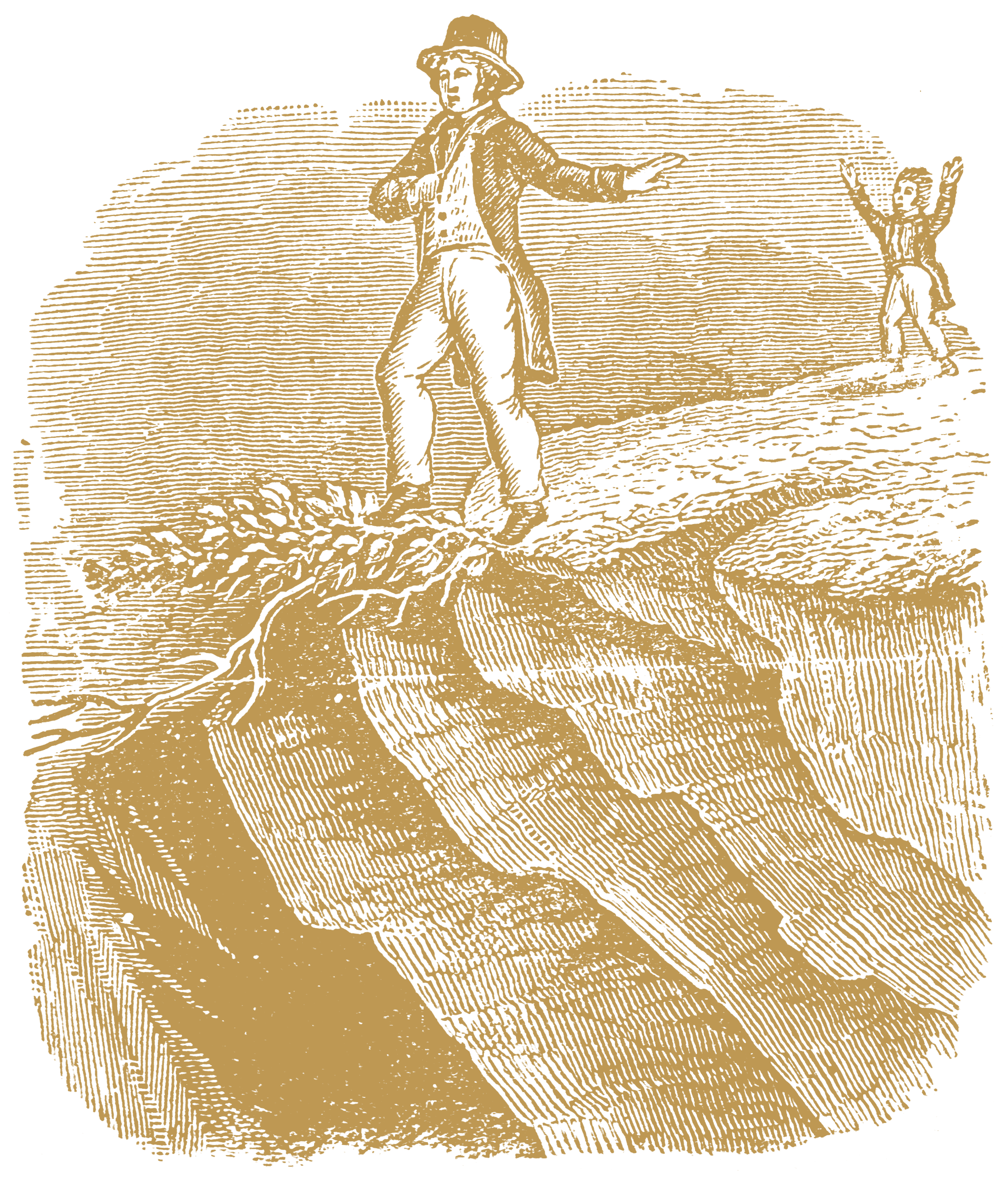Self-Confidence
DAY TWELVE
PONDER THIS ENGRAVING
MEDITATE ON THESE VERSES
Proverbs 3:5 | Proverbs 29:26 | 1 Thessalonians 5:3 | Proverbs 29:1 | Proverbs 6:15 | Proverbs 28:14,18 | Revelations 3:17 | 1 Corinthians 10:12
Seest thou a man wise in his own conceit? There is more hope of a fool than of him. Proverbs 26:12
POETIC REFLECTION
See how Self-confidence his friend doth treat,
Nor heeds the danger from beneath his feet;
With head erect, he proudly stalks along,
The warning voice is but an idle song;
As the precipice he draws more nigh,
But deaf and blind, he neither sees nor hears,
From friends or foes he nothing wants or fears;
He “knows, and that’s enough–all right,” where lo!
At once he falls into the gulf below;
Adown the rocks he tumbles o’er and o’er,
And sinks in darkness, to arise no more.
DEVOTION OF INTERPRETATION
The engraving shows a traveler in the greatest peril. He is on the brink of an awful precipice: he knows it not. But this is not the worst of his ease: he is confident in his knowledge, and that he is fully prepared for every emergency, although he has not examined any book of roads, or any charts or maps; nor as he made inquiries of others who have traveled these parts before him. A friend is seen, who endeavors to apprise him of his danger; he calls to him, but he turns a deaf ear to his remonstrances, and still proceeds. As he draws near the fatal brink, his friend, knowing his danger, exerts himself to the utmost to have him stop, to listen, but for one moment; but no, he has no need of advice; on he goes. The ground, which is hollow, gives way beneath his feet; he falls, and is instantly dashed to pieces. The name of the man is “Self-confidence.”
The moral of this is, that dangers stand thick all through the path of human life––dangers such as the lust of the flesh, the lust of the eye, and the pride of life, with their numerous attendants. False doctrines also, the tendency of which is to destroy the happiness of mankind, prevail. They are covered with a flimsy garb, which deceives superficial observers.
Moreover, youth is presumptuous, self-willed, and self-confident. They are too much inclined to follow the light which their own vanity has kindled. But their self-confidence does not remove the dangers from their path, nor render them invulnerable. But man is ignorant, how shall he know? helpless, what shall he do? If any man lack wisdom, let him ask of God. “Do” ponder well the paths of they feet. Lean not to thine own understanding. He that trusts to his own heart is a fool. In all thy ways acknowledge God; he will direct thy paths. Here, then, is the conclusion of the whole matter; imminent perils surround the youth, but the greatest of all perils is the danger of trusting to his own heart. Lean upon God, and all will be well. Though weak and ignorant, yet God is wise and strong, able to guide and preserve all those who trust in him.
The mariner who should put to sea without chart or compass, trusting to his own knowledge, would, without doubt, on the first stormy night, repent heartily of his folly. O, how much greater is the folly of those who, trusting to self, neglect to use the lamp of God’s truth, or to seek the enlightening influences of his Holy Spirit, or to follow the advice of the wise and good.
The case of Pharaoh, the Egyptian monarch, affords a striking example of self-confidence. When the children of Israel had left the house of bondage and were well on their journey toward the land of promise, the king, confiding in his strength, exclaimed, “I will pursue, I will overtake,” and presumptuously set forth for that purpose. Each recently-received plague remonstrated, and forbade the rashness of the monarch, but all in vain, on he rushed, even to the division of waters. In his self-confidence, he engaged in battle with Jehovah, God of Armies. The conflict was of short duration; the arm of the Lord prevailed; Pharaoh and his men of war were swept away with the waters of destruction.
Barber, John Warner, 1798-1885. Bible Looking Glass: Reflector, Companion and Guide to the Great Truths of the Sacred Scriptures, and Illustrating the Diversities of Human Character, and the Qualities of the Human Heart.
Philadelphia, Bradley, Garretson & Co., 1861

